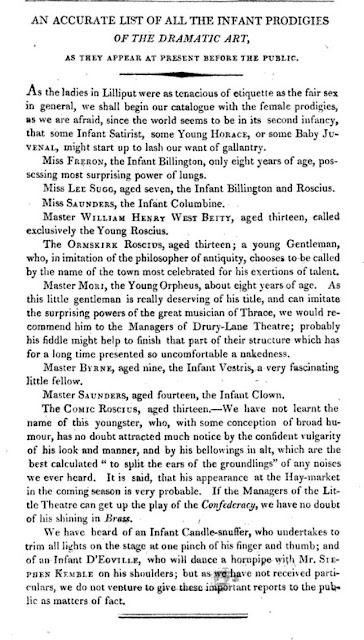In 1804, a fad, a trend, or a craze--call it what you will--was noted in British theatre. Children were acting adult parts, on stage with adult actors, in adult plays. It must have made for some awkward performances, and
uncomfortable scenes
The most notable, creating a stir wherever he went, was William Henry West Betty, or Master Betty, also known as the young Roscius. The original Roscius (d. 62 AD) was a Roman actor of great fame and actors of excellence were (and still may be?) given this 'title'.
illustration from
"Shakspere to Sheridan; a book about the theatre of yesterday and to-day (1922)"
Master Betty was thirteen at the height of his fame, and made enough money to live a comfortable life for many years.
There were juvenile stars even younger, however.
illustration from Walker's Hibernian Magazine July 1805
Little Miss Mudie was only seven years old. She performed to great acclaim as the Young Norval in Belfast in May 1805, but was later hissed at on stage in a version of The Country Girl. I have not discovered her ultimate fate.
The Monthly Mirror, a journal focusing on theatre matters, published from 1795 to 1811, contained the following article in its May 1805 issue.
It makes one wonder, knowing the difficulties modern child actors have faced in later life, what happened to these youngsters. Of this list, six seem to have disappeared without a trace. Did they live out their lives on the fringes of the theatre or suffer destitution and life on the streets?
A luckier few continued to be noticed.
Miss (Catherine) Lee Sugg, the infant Billington and Roscius, remained in the theatre world, and was later in life known as Mrs. Halkett.
The Ormskirk Roscius, Frederic Brown, was also known as Roscius the Second, but had neither the talent nor the skills of Master Betty. He seemed, even with equivocal reviews, set to continue in the theatre.
Master (Nicholas) Mori the young Orpheus, a violinist, was the greatest success story of all. He was a prodigy at eight, and continued to grow in skill as he aged. Held in great respect in adulthood, he held the patronage of three royal Dukes. He became a founder-associate of The Philharmonic Society, and performed throughout his life until his death in 1839.
It is sad to consider that most of the 'prodigies' did not find success. The fad for child actors was short-lived.
'Til next time,
_(14803216393).jpg)

